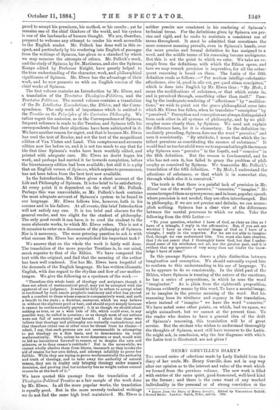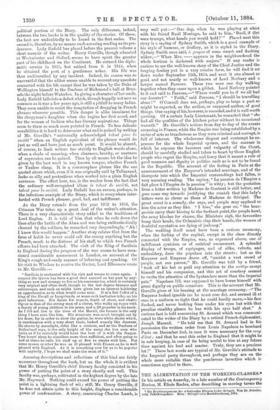HENRY GREVILLE'S DIARY.* Tim second series of selections made by
Lady Enfield from the diary of her uncle, Mr. Henry Greville, does not in any way alter our opinion as to the interest and value of the work which we formed from the previous volume. The new work is filled with entries of the same quiet, good-humoured, well-bred kind as the former ; and there is the same want of any marked individuality in the personal or of strong conviction in the
• Leases from the Diary of Henry Greeille. Edited by Viscountess Enfield. Second Series. London: Smith, Elder, and Co. 1881. political portion of the Diary. The only difference, indeed, between the two books is in the quality of the stories. Of these, the best are undoubtedly to be found in the first series. The second is, therefore, by no means such amusing reading as its pre- decessor. Lady Enfield has placed before the present volume a short memoir of the writer. Henry Greville, though educated
at Westminster and Oxford, seems to have spent the greater part of his childhood on the Continent. He entered the diplo- matic service in 1833, but retired from it in 1844, when he obtained the post of a gentleman usher. His life was thus undiversified by any incident. Indeed, its course was so uneventful that the editor seems unable to recount any anecdote connected with his life except that he was taken by the Duke of Wellington himself to the Duchess of Richmond's ball at Brus- sels the night before Waterloo. In giving a character of her uncle, Lady Enfield falls into a defect which, though happily not now so common as it was a few years ago, is still a pitfall to many ladies.
They seem unable to resist the temptation of dragging in French phrases wherever possible. This danger is alike imminent for
the clergyman's daughter when she begins her first novel, and for the woman of fashion who has literary aspirations. Things seem to them so much more pointed in French. To less delicate sensibilities it is hard to determine what end is gained by writing of Mr. Greville's "universally acknowledged talent pour la societ6 " when an English equivalent of the phrase would do
just as well and have just as much point. It would be absurd, of course, to limit writers too strictly to English words alone, when a shade of meaning, when clearness, brevity, or neatness of expression can be gained. Then by all means let the idea be given by the best word in any known tongue, whether French or Yankee slang. It is a commonplace phrase like the one quoted above which, even if it was originally said by Talleyrand, looks so silly and pretentious when worked into a plain English sentence. The effect here, too, is the weaker from the fact that
the ordinary well-recognised idiom is talent de 8oci4te, not talent pour la societe. Lady Enfield has an excuse, perhaps, in
the infections example of the Diary, which is everywhere inter- larded with French phrases, good, bad, and indifferent.
As the Diary extends from the year 1852 to 1856, the Crimean War takes up a great deal of the writer's attention. There is a very characteristic story added to the traditions of Lord Raglan. It is told of him that when he rode down the lines after the battle of the Alma and was being enthusiastically cheered by the soldiers, he remarked very despondingly, " Ah ! I knew this would happen." Another story relates that from the force of habit he never could call the enemy anything but the French, mach to the distress of his staff, to which two French officers had been attached. The visit of the King of Sardinia to England during the progress of the war seems to have occa- sioned considerable amusement in London, on account of the King's rough-and-ready manner of behaving and speaking. Of his visit to Windsor to receive the Garter, Lord Ellesmere wrote to Mr. Greville :—
"Sardinia is enchanted with his visit and means to come again. I suspect the Queen has been a good deal amused on her part by any- thing so new and strange to her as his conversation, which is certainly very original and often droll, though to the last degree brusque and soldatesque, and such as might have given her an interest bordering on apprehension as to what would come next. II m'a fait l'effet of a king of the Heruli or Loogobards, or some such barbarian tribe, on his good behaviour. His figure for muscle, depth of chest, and elastic vigour is that of the strong man of a circus, who walks up ropes with a family of young children in his arms, and a 29-pounder in his teeth. As I did not live in the time of the Heruli, the former is the only thing I have seen like him. His structure was much brought out by his dress, for in order to show the garter, he wore white shorts which, in combination with a very short tunic, looked exactly like drawers. He shoots by moonlight, rides like a centaur, and as the Duchess of Sutherland says, is the only knight of the many she has seen who looks as if he certainly would have the best of it with the dragon. Two hours' sleep he considers more than sufficient, and after going to bed at three he calls his staff up at five to smoke with him. For some reason or other he was as ill pleased with France as he is well pleased with England. As it is something new for us to be popular with anybody, I hope we shall make the most of it."
Amusing descriptions and reflections of this kind are fairly numerous throughout the book, but on the whole it is evident that Mr. Henry Greville's chief literary faculty consisted in his power of putting the point of a story shortly and well. This
faculty was, perhaps, cultivated in the highest degree by the late Mr. Hayward. Nothing could exceed his power of putting the point in a lightning flash of wit ; still, Mr. Henry Greville, if lie does not attain quite to this height, displays a considerable power of condensation. A story, concerning Charles Lamb, is very well put :—" One day, when he was playing at whist with his friend Basil Montagu, he said to him, Basil, if dirt were trumps, what hands you would hold !' " Placed next this story is a saying of Sydney Smith, which is a good example of his style of humour, or drollery, as it is styled in the Diary. Sydney Smith once said, a propos of some smart and dashing widow,—" When Mrs. — appears in the neighbourhood the whole horizon is darkened with majors." If any reader is carious to see the well-known story of the Chief Justice and the braying donkey put in a very concise form, he will find it set down under September 13th, 1854, and next it one almost as good and not nearly so well-known of Lord Norbury and a lawyer named Parsons. These two were one day walking together when they came upon a gibbet. Lord Norbury pointed to it and said to Parsons,—" Where would you be if we all had our deserts ? " "Faith," said Parsons, "I should be travelling alone ! " O'Connell does not, perhaps, play so large a part as might be expected, as the author, or supposed author, of good things. One saying of his, however, is recorded, and it is well worth quoting. Of a certain Lady Lieutenant, he remarked that "she had all the qualities of the kitchen poker without its occasional warmth." Mr. Greville's notices from day to day of the events occurring in France, while the Empire was being established by a series of acts as treacherous as they were criminal and corrupt, is full of interest. The wholesome disgust and contempt he ex- presses for the whole Imperial system, and the manner in which he exposes the baseness and vulgarity of the Court, should be carefully studied and taken to heart by those English people who regret the Empire, and fancy that it meant a rule of good manners and dignity in politics such as is not to be found in the Republic. The account of the feeling in Paris at the announcement of the Emperor's intended marriage, and of the disrepute into which the Imperial surroundings had fallen, is very amusing reading. The saying, "La passion de l'Empire a fait place h rEmpire de la passion" is witty ; but the quotation from a letter written by Madame de Gontant is still better, and goes some way towards justifying the remark that this lady's letters were as clever as those of Madame de Sevigne. The great event is a comedy, she says, and people may applaud or hiss the actor as they like. "I hiss," she goes on, "the bour- geoisie carry their hissing to the furthest point, the people howl, the army blushes for shame, the Ministers sigh, the favourites hang their heads, the Orleanists clap their hands, the women of doubtful reputation are dying of jealousy."
The wedding itself must have been a curious ceremony, when the feeling of the capital, except in the class directly connected with the Empire, was, as expressed above, one of indifferent cynicism or of satirical amusement. A splendid display of troops, of equipages, and of silks, velvets, and embroidery, drew the populace into the streets ; but as the Emperor and Empress drove off, "amidst a vast crowd of people, not one person," Mr. Greville was told by a friend, "took off his hat or paid any attention to the cortege except himself and his companion, and this act of courtesy seemed to excite the attention of the bystanders more than the imperial pair." Napoleon III. was supposed to have borne himself with great dignity on public occasions. This is the account that Mr. Greville gives of his bearing at the marriage ceremony,—"The Emperor looked ignoble (as he must ever do), and seemed ill at ease in a uniform so tight that he could hardly move,—his face flushed, and never looking from under his eyes but with that peculiar stealthy glance be has with his eyes half shut." A curious fact is told concerning St. Arnaud which was communi- cated to the writer of the Diary by a retired French diplomatist, Joseph Mareuil. "He told me that St. Arnaud had in his possession the written order from Louis Napoleon to bombard Paris on December 2nd, in case it were necessary for the coup d'aat ; and that he sent this order to England that it might be in safe keeping, in case of its being useful to him at any future time against his lord and master. Traly, they are a precious lot !" These last words are typical of Mr. Greville's attitude to the Imperial party throughout, and perhaps they are on the whole more suitable than the ponderous invective which is sometimes applied to them.



































 Previous page
Previous page